Hussam al-Mahmoud | Khaled al-Jeratli
Jordan’s struggle against drug smuggling operations from Syria into its territory is not new, as these operations represent a disturbing threat to the peace and stability of the region that Arab countries in general, and the Gulf states in particular, are grappling with. This has led to including this file in the “Jordanian Initiative” for a solution in Syria.
What preceded the initiative in this context does not differ fundamentally from what followed it, except for an increase in the pace of smuggling attempts, much like all the initiative’s files that have taken a reverse and different course from what the Arabs aspire to achieve from Damascus.
Even the increase in smuggling has taken on new forms and shapes, heightening the severity and frequency of the operations, to the point where they are repeated within the same week, and simultaneously converting the border area between the two countries into a tension hotspot and a stage for clashes between members of the Jordanian border guards and smuggling groups.
Enab Baladi discusses in this lengthy report, with experts, specialists, and researchers, the escalation of drug smuggling from Syria to Jordan, the responsible parties behind it, and the available or possible options in front of Amman to stop the “flood” of drugs, along with the political repercussions that these operations have caused.
Changing rules of engagement
The policy of discretion and merely waiting for the smugglers to enter Jordanian territory has changed with the alteration of the smuggling pattern and its expansion. On January 9, Jordan targeted drug storage warehouses and bases in southern Syria via air raids and a special force from the Jordanian army and security agencies raided dens of smugglers and drug dealers near the border locations, resulting in seven wanted individuals with connections to smuggling gangs and drug traffickers being arrested.
Brigadier General Mustafa al-Hayari, Director of Military Media in the Jordanian Armed Forces, told Al-Mamlaka Jordanian TV channel that “organized” gangs are behind the smuggling from Syria, indicating that the smugglers have received military training in an organized operation backed by foreign agendas.
On January 6, the Jordanian-Syrian border witnessed clashes between Jordanian border guard forces and drug smugglers that lasted from dawn to evening, resulting in five deaths, the arrest of 15 smugglers, and wounding one.
During the incident, 627,000 Captagon pills, 3,439 cannabis bags, and a Kalashnikov firearm, within the area of responsibility of the Eastern Military Region (on the southern border with Syria), were seized.
These clashes, which saw Jordanian forces enter deep into Syrian territory, occurred one day after two air raids that Jordanian media outlets reported were conducted by the Jordanian Air Force inside Syrian territory, targeting drug smugglers, and as the website Roya news reported, the Royal Jordanian Air Force bombed a house belonging to a suspected “major” drug dealer in As-Suwayda, as well as another air raid targeting warehouses near al-Gariya in As-Suwayda as well.
On December 19, 2023, Al-Mamlaka Jordanian TV channel reported on the armed forces that the Border guard forces clashed for 14 hours with “armed groups” attempting to cross the border into Jordan illegally from Syrian territory, resulting in the death and injury of several smugglers, the arrest of nine of them, and the seizure of large quantities of drugs and automatic and rocket weapons.
Major General Yousef Huneiti, Chief of the Joint Staff of the Jordanian Armed Forces, stated at the time that his country’s army used all capabilities and resources to prevent smuggling and infiltration operations and to forcefully respond to them after 14 hours of clashes.
Jordan conducted its first air raids in Syria in May 2023, where its aircraft bombed targets in the Lajat area between the provinces of Daraa and As-Suwayda in southern Syria, resulting in eight fatalities among the family of the prominent drug smuggler Marai al-Ramthan, who was killed in the same targeting.
Nawar Shaaban, a military affairs researcher at the Omran Center for Strategic Studies, told Enab Baladi that the Jordanian military escalation in southern Syria was not premeditated, but rather an emergency response to an escalation in smuggling operations towards its territory, and a qualitative change from smuggling and fleeing to clashing with the Jordanian border guards with the intent of crossing.
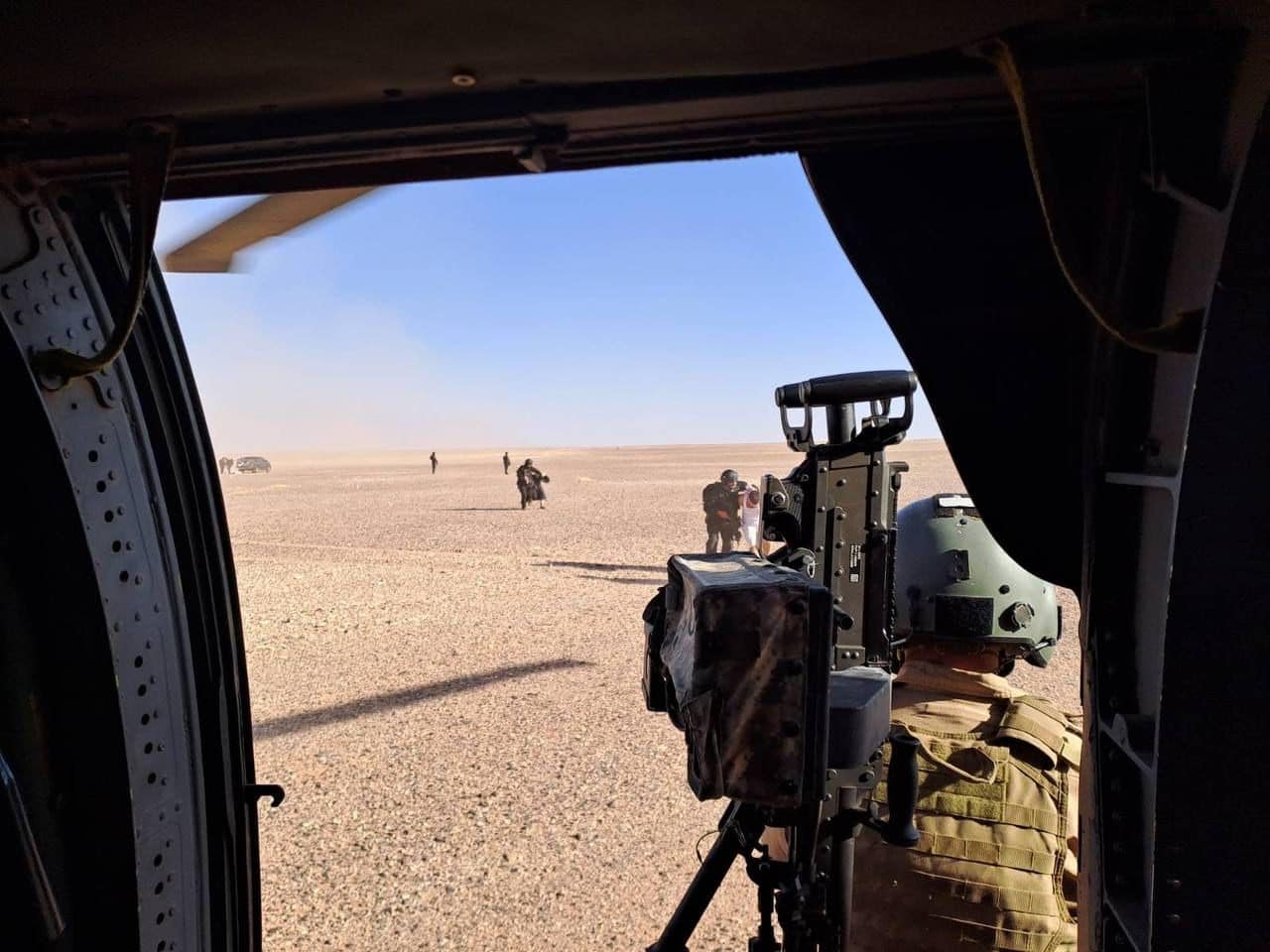
Part of a joint raid by Jordanian army forces and security forces on dens of smugglers and drug dealers near the Syrian border – January 6, 2024 (Jordanian Public Security Directorate/Facebook)
The regime ignores the events
As smuggling operations intensified, Mustafa al-Hayari, Director of Military Media in the Jordanian Armed Forces, said during an interview with Al-Mamlaka TV channel on January 7, that those behind the drug smuggling attempts on Jordan’s northern borders are “gangs”, also referring to a responsibility that rests with the “Syrian state”, and that there had been more than one communication between Amman and Damascus regarding drug smuggling, but it was fruitless.
Al-Hayari considered that the current surge in smuggling is linked to the weather conditions in winter, but it goes beyond the natural or hypothetical increase in previous winters, as the matter has gone beyond simply introducing drugs to attempts at introducing weapons.
And he mentioned that the results of the investigation revealed monitoring communications from smugglers and gangs that organize them, with the names of Saudi Arabia and other countries being mentioned, indicating that they want to go beyond this stage to others.
Jordanian statements have not been responded to by Damascus, and Syrian regime president Bashar al-Assad, during a filmed interview with Sky News Arabia, commented about the transiting of drugs from Syria to Jordan, stating that “drug trade as a crossing and as a domicile is always present, this is a fact, but when there is a war and state frailty, it’s unquestionable that this trade flourishes; this is natural.”
During the interview broadcast on August 9, 2023, al-Assad attributed the responsibility of drug smuggling to “countries that contributed to creating chaos in Syria, not the Syrian state.”
Not commenting on the recent Jordanian operations, including incursions inside Syrian territory, Dr. Amer al-Sabaileh interprets it as an “acknowledgement” of being unable to control the borders, and recognition that Jordan does not target “Syrian sovereignty”, rather it is responding to the escalation of smuggling attempts toward it.
Chronic war, More than one choice
Statements hinting at Jordan’s need for support and cooperation from affected states in the drugs file were preceded by an official Jordanian request for assistance, presented by King Abdullah to the US Defense Secretary Lloyd Austin during a visit to Amman on March 6, 2023.
King Abdullah of Jordan requested American assistance in the escalating “drug war” on his country’s border with Syria, attributing the responsibility of drug smuggling across the border to Iran-backed militias.
Reuters agency reported from Jordanian sources that Amman wants more US aid to boost border security since Washington has provided about a billion dollars since the start of the conflict in Syria for establishing border centers between Syria and Jordan.
Dr. Omar Basha al-Raddad, a Jordanian expert in strategic security, explained to Enab Baladi that Jordan indeed seeks Saudi support on two levels; the first is manifested by raising the level of coordination regarding drug control at both the intelligence and security levels and exchanging information about networks in Jordan, Saudi Arabia, Lebanon, and Syria, as it has been proven that these networks cross borders, and Jordan faces clear stumbling in coordination with the Syrian regime.
Furthermore, Lebanon is managed by Hezbollah, which provides cover and benefits from these operations, as are Syrian security services. The researcher sees that Jordan has information about these local and regional networks and needs assistance along the borders for technical and military aid that may be available with Saudi Arabia or it can provide, especially since it is an established fact that millions of pill drugs were en route to Saudi Arabia.
On January 11, the Saudi Zakat, Tax and Customs Authority announced thwarting an attempt to smuggle more than 841,000 Captagon pills, hidden in specially manufactured steel boxes for the purpose of smuggling in one of the trucks coming into the Saudi kingdom.
“Jordan has made its decision, and on the table, there are options, including a buffer zone in southern Syria, which is currently a distant option. However, Jordan has proceeded towards managing the crisis through military confrontation and changing the rules of engagement, striking components of the gangs and manufacturing centers at locations opposite the border, and confronting them after these gangs have entered the Jordanian borders,” added the Jordanian expert.
Regarding the possibility of other countries or forces allying with Jordan to curb these smuggling operations, al-Raddad clarified that Jordan operates on the principle of forming a regional coalition from states harmed by drug smuggling, excluding the possibility of it being left alone in this confrontation.
In turn, the retired Saudi Major General Abdullah Ghanem al-Qahtani, a researcher in strategic and security studies, clarified that the war on drugs is chronic, long, and painful. Saudi Arabia has experience in confronting and thwarting drug smuggling attempts through land, sea, and even air. However, there is a noticeable disparity in efforts, and Arab states are not united as one man in combating drugs.
Al-Qahtani, in his talk with Enab Baladi, considered that the Saudi Kingdom leads efforts to confront drugs, and what the Jordanians are doing to confront drug smuggling has political connections to what is happening in Gaza and the region, as the driver for the drugs is the “Resistance Axis”, which extorts countries this way whenever it faces pressure; and he elaborated that behind these networks are countries and organizations.

The Arab Liaison Committee Meeting concerning Syria in the Egyptian capital, Cairo – August 15, 2023 (Egyptian Foreign Ministry Spokesperson/Twitter)
Reflections on the ground
On December 20, 2023, the Saudi Asharq Al-Awsat newspaper reported that the complications of the security situation on the Jordanian-Syrian border had politically reflected on the level of communications between the two sides, which became almost severed.
The newspaper explained that Amman had expressed its annoyance on more than one occasion due to the Syrian side’s failure to fulfill its military and security commitments on the “unilaterally protected” border.
Jordanian security decision-makers also see Damascus’s lack of seriousness in putting an end to militias as the other face of the regime’s exporting of crises towards neighboring countries.
While drug smuggling operations from Syria are ongoing on a regional scale towards neighboring countries, foremost among them Jordan, then the Gulf Arab states, the Syrian regime is promoting drug combat efforts through repeated announcements from its Ministry of the Interior about the arrest of those “involved” in drug trafficking and local promotion. However, the reality associated with the file does not suggest Jordanian or Arab conviction in this promotion.
The Jordanian military actions to curb smuggling are not surprising, as Amman had hinted since May 2023 at the possibility of a military operation in Syria to eliminate smuggling, and Jordan’s Foreign Minister, Ayman Safadi, spoke in September 2023 about the magnitude of the successful attempts at smuggling operations, indicating that there is one successful operation for every three detected at the borders.
These statements were translated on the ground into more cautious measures regarding what reaches Jordan from Syrian territory. In this regard, Jordan’s Interior Minister, Mazen al-Faraya, said that his country treats every truck entering the Nassib-Jaber crossing from Syria as if it were loaded with drugs, confirming that one of the main reasons for the increase in drugs in Jordan is the situation in Syria.
At the beginning of 2023, the Jordanian Foreign Minister discussed with the Russian President’s envoy to Syria, Alexander Lavrentiev, the need to establish security and stability on the Syrian side and confront drug smuggling from Syria to Jordan and the terrorism and presence of militias.
During his participation in the ministerial meeting of the Global Coalition to Address Synthetic Drug Threats, in July 2023, Safadi considered the global danger of synthetic drugs and the enormous resources available to their manufacturers and smugglers, necessitating a joint international effort to face this danger. At the same time, he expressed Jordan’s readiness to cooperate in confronting the drug menace, which cannot be resolved without genuine international cooperation, reflecting the Jordanian skepticism about the Syrian regime’s ability to control the issue. This was expressed by the Jordanian King in September of the same year when he said that he was not sure if al-Assad was fully responsible for the country in light of the major problem represented by drug and weapon smuggling into Jordan.
He added, “I think Bashar doesn’t want this to happen, and he doesn’t want a conflict with Jordan, I don’t know how in control he is.”
Efforts have not borne fruit
In early November 2023, the 37th Arab Conference of Heads of Drug Control Agencies was held in the Jordanian capital, Amman, organized by the General Secretariat of the Council of Arab Interior Ministers.
At that time, the Jordanian Interior Minister appreciated the role played by drug enforcement agencies in Arab countries in confronting and fighting this scourge to prevent attempts to cultivate, produce, and smuggle narcotics in Arab countries, the region and the world, as reported by Jordan’s Public Security Directorate.
In June of the same year, the Jordanian-Syrian Joint Committee held its first meeting for cooperation in combating drug smuggling across the Syrian borders into Jordan, as mentioned by the Jordanian Ministry of Foreign Affairs.
The meeting was chaired on the regime’s side by the Minister of Defense, Ali Mahmoud Abbas, and the Director General of Intelligence, Husam Louka, and on the Jordanian side by the Chief of the Joint Staff, Yousef Huneiti, and the Director of General Intelligence, Ahmad Husni.
The meeting discussed joint cooperation in confronting the “danger of drugs and their sources of production and smuggling, and the parties that organize, manage, and execute smuggling operations across the borders towards Jordan.”
These steps remain without a clear political or negotiating path that would lend them the required seriousness; the Arab Liaison Committee (foreign ministers from Egypt, Iraq, Saudi Arabia, Jordan, Lebanon, and the Syrian regime) to follow up on the solution in Syria, and implement the Jordanian Initiative (which includes solving the drug problem), only held a single meeting in August 2023, before the Lebanese Foreign Minister, Abdullah Bou Habib, spoke on October 8, 2023, about intense Western pressure to prevent the committee from giving anything to the Syrian regime, on the grounds that “It’s enough that you brought back the Syrian government to the Arab League.”
To please Amman
Research fellow at the Omran Center for Strategic Studies, Nader Khalil, explained to Enab Baladi that Amman is trying to draw Gulf support for combating drugs coming from Syria, and the Arab Initiative was designed, in part, to respond to Jordanian concerns and demands, meaning that the Gulf states, specifically Saudi Arabia and the UAE, were politically in agreement with Jordan to some extent, with the exception of the disagreement over the level and speed of official normalization with the regime, in order to convince it to rein in drug trafficking.
Regarding Amman’s ability to obtain Gulf support in combating drugs coming from Syria, the researcher believes that the current Emirati-Saudi treatment of the risks and challenges coming from Iran is based on trying to reach an understanding with Iran itself instead of the previous method of confronting these risks and challenges in harsh ways, which means that Jordan may receive financial support to back its efforts to control the Jordanian-Syrian borders.
Jordan does not have many options beyond what it is currently doing, except for the possibility of escalating the mechanism it has started to employ, namely directly targeting militias involved in drug and weapon trade in southern Syria, although this mechanism also reflected an escalation on the militia’s part as well, and any other scenarios are linked to the positions of regional and international players.
Nader Khalil, Research fellow at the Omran Center for Strategic Studies
Regarding the regime’s ability to implement any response that Amman and the Gulf would be satisfied with in this file, researcher Nader Khalil considered that a large part of the regime’s security and military composition, and its patronage within, is linked to this industry and trade, and it is difficult to significantly curb this activity, in addition to Iranian penetration in this file.
According to the researcher, any more serious action on this front by the regime would only happen if there was a qualitative military threat from external forces because of this file, which is unlikely in the medium term.

A joint special force from the ranks of the Jordanian Armed Forces and security agencies raided the hideouts of a number of smugglers and drug dealers near the border sites of the Eastern Military Region – January 6, 2024 (Jordan Public Security Directorate/Facebook)
Changing smuggling patterns
Since the end of 2023, smuggling operations from Syria to Jordan have seen an increase in volume and a shift in nature. Jordanian media, including “Jordan TV” and “Al-Mamlaka” channel, reported from a military unnamed source in the General Command of the Jordanian Armed Forces that clashes occurred on the border with Syria to thwart the smuggling of “large quantities” of drugs, automatic and rocket-propelled weapons.
The clash was considered the fifth consecutive one, as Jordanian authorities announced on December 5th, 12th, 14th, and 15th, 2023, that clashes had taken place between their forces and armed smugglers, resulting in the death of a Jordanian soldier and an unspecified number of smugglers.
In 2018, immediately after the regime regained control of the southern region of Syria, Al-Mamlaka Jordanian channel quoted an unnamed security source stating that the “Syrian crisis” had caused an increase in the number of weapons in Jordan, with weapon smuggling into the kingdom increasing by 400%, equaling about 14,000 different weapons.
There are more than a million “unlicensed” weapons in Jordan, according to unofficial statistics reported by the Jordanian channel, ranging from hunting rifles and Russian Kalashnikov rifles to hand grenades and remote detonation devices. The channel explained that the length of the border (approximately 380 kilometers) has contributed significantly to the increase in smuggling operations.
Five years after the regime’s takeover of the area, smuggling operations became almost daily routine announcements, but unlike before, Jordan did not point fingers at any specific side. Today, the smuggling operations are attributed to groups loyal to Iran in Syria, aiming to enter Saudi territory through Jordan.
In April 2023, researchers Matthew Levitt and Lauren Von Thaden, specialists in counterterrorism at the Washington Institute for Near East Policy, wrote a brief analysis about weapons smuggling specifically towards the West Bank in Palestine through Jordan. They pointed out that a section of the border junction between Jordan, Syria, and Iraq had previously been under the control of “jihadist” groups, which made patrolling it more challenging, but the situation did not improve even after Syrian regime forces regained control over the border areas.
Messages across the border
According to repeated statements by Jordanian officials, the Syrian regime has made political and economic gains from drug smuggling operations into the Gulf states via Jordan from Syrian territory.
In an interview with Al Jazeera, former Jordanian Minister of Information, Samih Maaytah, said, “A state that claims to have won the war (referring to the Syrian regime) and defeated the opposition cannot prevent (drug smuggling), this is illogical.” He considered Captagon to be an economy for the “Syrian state,” the regime, the family of the head of the regime, as well as for militias and military institutions.
While smugglers frequently crossed into Jordan with millions of drug pills, Amman launched the “Jordanian Initiative,” aimed at reintegrating the Syrian regime into its Arab surroundings, and claimed its seat in the Arab League in May 2023, following a set of terms, one of which was dealing with smuggling operations.
Amer al-Sabaileh, a strategic expert and non-resident researcher at the Stimson Center in Washington, told Enab Baladi that targeting Jordan with smuggling operations coming from Syria can be viewed in more than one way. Geographically, Jordan is considered a gateway to the Gulf states, but its alliance with the West also forms a political factor and thus could be targeted if there was a desire to target the Western alliance.
He added that creating “hotspots” in Jordan constitutes another aspect of pressure on the West, thereby relieving pressure on other points or regions or changing American priorities.
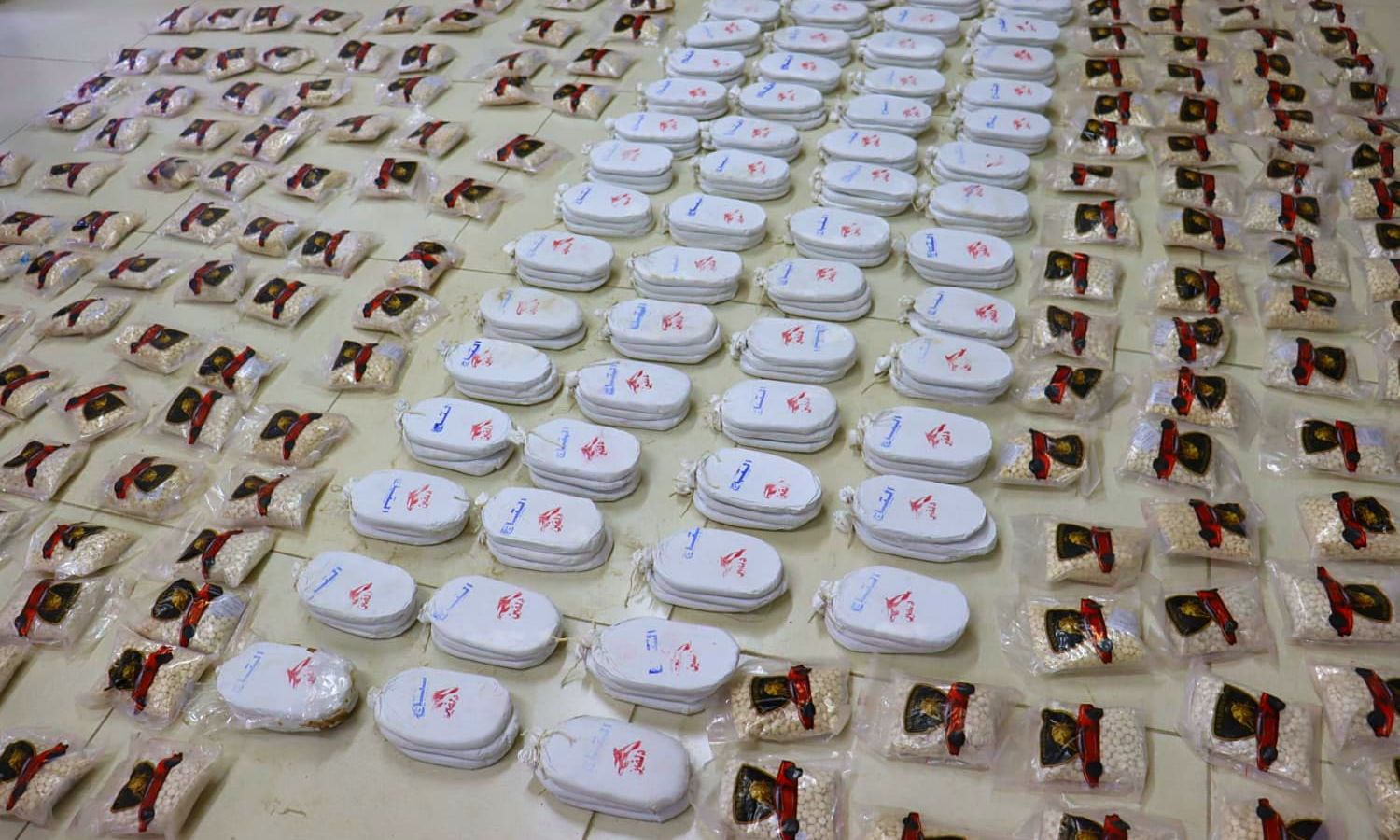
Quantities of drugs seized by the Jordanian army while attempting to smuggle them to Jordan via Syrian territory – December 22, 2023 (Jordanian Armed Forces)
Countermeasures ineffective
Jordan’s concern about the increase in smuggling operations and the security and military mobilization on the border with Syria have not yielded enough results to prevent drugs from reaching Jordan. Jordanian Foreign Minister Ayman Safadi had previously stated that out of every three smuggling operations from Syria, one succeeds.
The researcher Shaaban explained the nature of what is happening by stating that southern Syria is used for storage purposes, indicating that drug smuggling operations are subject to multiple stages, these stages are distributed across regions, where there is an area for receiving raw materials, another for production, as well as a storage and smuggling area.
The researcher believes that southern Syria is responsible for the last stage of this production cycle, managed by the party controlling the area (the Syrian regime and Iran-backed groups).
Despite Jordan’s escalation against the increase in smuggling operations, Shaaban pointed out that the Jordanian activity is limited to targeting the last stage of the production cycle, but has not been able to damage the operating system responsible for the production processes. As long as production continues, so will smuggling.
The researcher believes that Jordan’s counter-smuggling strategy targets the “tools of smuggling,” and therefore, these operations cannot end by solely targeting the means, which requires addressing all stages of production.
He pointed out that the Syrian regime is incapable of controlling the area, despite Arab political attempts that presented propositions demanding the Syrian regime to reduce smuggling operations towards Jordan. It has proved incapable amid Iranian activity in the area and the activities of the Lebanese Hezbollah militia.
Where is the guarantor?
The southern part of Syria has long been a living example of the shift in the balance of power in the region, following the Russian intervention in favor of the Syrian regime. The latter managed to control the southern provinces, while the United States abandoned the opposition factions there in 2018, leading to Russian and regime control over the area under what later became known as the “settlement agreement.”
The agreement, which also involved Jordan, required the withdrawal of Iranian militias from the area, as well as Syrian regime forces loyal to them, such as the Fourth Division led by Maher al-Assad, brother of Syrian regime’s president Bashar al-Assad. Russia played a pivotal role as a guarantor for the withdrawal of these militias from the area.
With Russia distracted by its invasion of neighboring Ukraine, its presence in southern Syria began to diminish, paving the way for an Iranian expansion that occupied the Jordanian borders with smuggling activities, and the Israeli borders with frequent missile strikes.
Raed Jabr, a journalist and expert on Russian affairs, told Enab Baladi that the Russian stance has changed against the backdrop of the war in Ukraine and the nature of the situation in the region today due to the war in Gaza.
For years, Russia has shown less enthusiasm and sensitivity towards its relationship with Iran on the one hand, and Israel on the other, especially regarding the balances it had previously established in the region.
Against the backdrop of the rift that the Ukrainian war caused in the balance, Jabr believes that Russia has started to overlook Iran’s movements and Tehran’s activities in Syria.
Although Russia has shown no enthusiasm for continuing its role as a guarantor of Syria’s southern neighbor’s borders, Moscow’s lack of desire to ignite a front from southern Syria towards the occupied Syrian Golan prompted it to establish new military posts in the Golan Heights days ago.
Through recent Russian movements in southern Syria, it appears that Moscow has abandoned its previous role in keeping Iranian militias out of southern Syria, according to Jabr; these movements suggest that it is maintaining a new mechanism regarding the spread of Iranian militias.
It seems unlikely that Moscow will take any steps in the near future to return to controlling the Iranian presence in Syria, or to sit at the negotiating table on this matter, according to Jabr.
if you think the article contain wrong information or you have additional details Send Correction
النسخة العربية من المقال
-
Follow us :
Most viewed
- Syrian Defense Ministry appoints "Abu Amsha" as Hama Brigade commander
- SDF faces two fronts... Damascus negotiates and Ankara wants war
- Former Syrian Interior Minister Mohammad al-Shaar surrenders to authorities
- Al-Sharaa meets Bin Salman: Together towards a true partnership
- Syrians hope for a new state without "wasta"












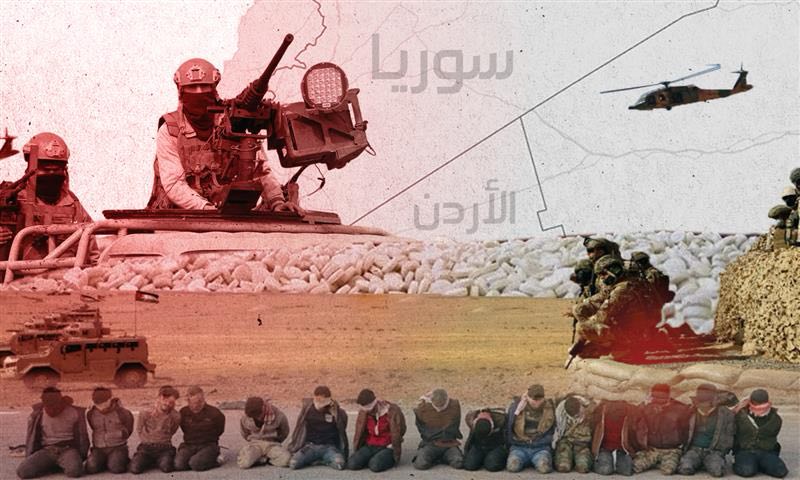
 Jordanian forces confront drug smugglers on the Jordanian-Syrian border (Edited by Enab Baladi)
Jordanian forces confront drug smugglers on the Jordanian-Syrian border (Edited by Enab Baladi)





 A
A
A
A
A
A
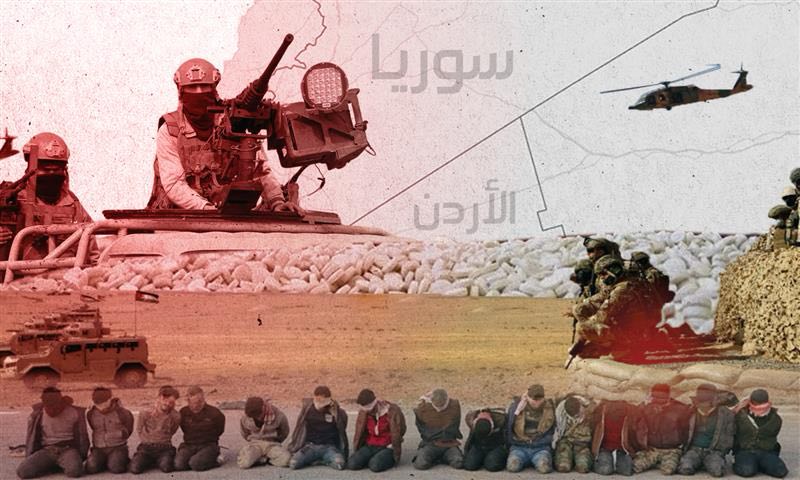




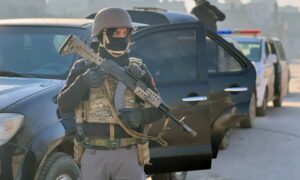


 More In-Depth
More In-Depth